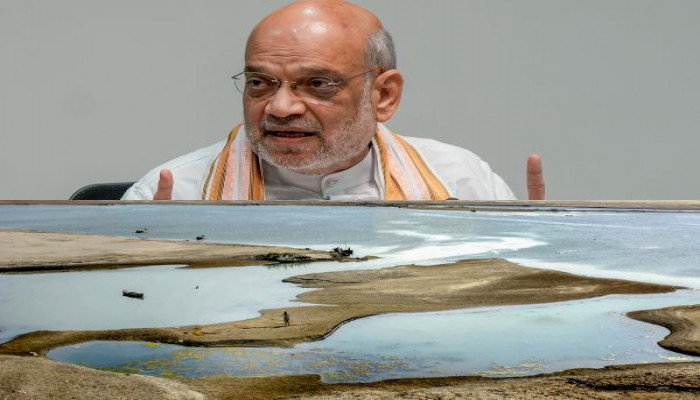'India will never restore Indus Waters Treaty', Amit Shah warns Pakistan
- In Reports
- 06:20 PM, Jun 21, 2025
- Myind Staff
Union Home Minister Amit Shah issued a stern warning to Pakistan. He declared that India would never restore the Indus Waters Treaty. He said the neighbouring country would be left starving for water.
“No, it will never be restored. International treaties can’t be annulled unilaterally, but we had the right to put it in abeyance, which we have done. The treaty preamble mentions that it was for peace and progress of the two countries but once that has been violated, there is nothing left to protect," Amit Shah told The Times of India in an exclusive interview.
He added, “We will take water that was flowing to Pakistan to Rajasthan by constructing a canal. Pakistan will be starved of water that it has been getting unjustifiably.”
India put into "abeyance" its participation in the 1960 treaty, which governed the usage of the Indus river system, after 26 civilians in Kashmir’s Pahalgam were killed. The treaty had guaranteed water access for 80% of Pakistan’s farms through three rivers originating in India.
Earlier, when India announced the suspension of the IWT, Pakistan had said that any attempt to stop or divert the flow of water would be considered an “Act of War” and would be met with a response using the full spectrum of national power.
“Any attempt to stop or divert the flow of water belonging to Pakistan as per the Indus Waters Treaty, and the usurpation of the rights of lower riparian will be considered as an Act of War and responded with full force across the complete spectrum of National Power,” said the official statement.
Pakistan remained worried over India’s move to suspend the treaty as it depended heavily on water from the river system for its hydropower and irrigation needs.
Pakistan expressed concern that India’s dams would cut flows on the river, which fed 80% of its irrigated agriculture. It asked for a neutral expert and then an arbitration court to intervene in two recent hydropower projects.
India started working towards a larger inter-basin water transfer plan to fully utilise its share of Indus river waters. According to The Times of India, a feasibility study was underway for a 113-km canal that would divert surplus flows from Jammu & Kashmir to Punjab, Haryana, and Rajasthan. This canal would link the Chenab with the Ravi-Beas-Sutlej system.
The project aimed to optimise India’s share under the Indus Waters Treaty by ensuring better use of both eastern (Ravi, Beas, Sutlej) and western (Indus, Jhelum, Chenab) rivers, and by curbing excess flows into Pakistan.
Sources told ToI that the proposed canal network would tie into 13 existing canal structures across J&K, Punjab, Haryana, and Rajasthan, eventually feeding into the Indira Gandhi canal system. To facilitate this, the Centre also considered doubling the length of the Ranbir canal from 60 km to 120 km, and fully utilising the Pratap canal, based on feasibility assessments.
The Ujh multipurpose project in Kathua district, pending for years, was also being revived. A second Ravi-Beas link below Ujh, planned earlier to stop excess Ravi water from entering Pakistan, was now included in the larger canal initiative. It would involve a barrage and a tunnel to transfer water to the Beas basin. The Ujh is a tributary of the Ravi. These initiatives added to ongoing short-term measures such as desilting reservoirs at Baglihar and Salal hydro projects on the Chenab.
India also sped up work on several hydroelectric plants, Pakal Dul (1,000 MW), Ratle (850 MW), Kiru (624 MW), and Kwar (540 MW) to better utilise its Indus system share, ToI reported.
Recently, Prime Minister Shehbaz Sharif reaffirmed Pakistan's willingness to talk with India on all outstanding issues, including Jammu and Kashmir, the Indus Water Treaty, trade and counter-terrorism. However, India made it clear that it would only have a dialogue with Pakistan on the return of Pakistan-occupied Kashmir and the issue of terrorism.







Comments